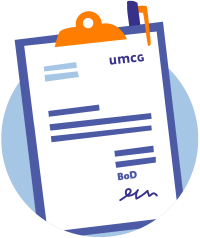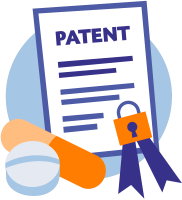If a discount, compensation, or reimbursement is given for this external activity (for example, a discount on conference costs or reimbursement of hours when giving a presentation), an agreement must be drawn up in the name of the UMCG. Any compensation received is for the department. In this case, notification to the transparency register is also necessary (see Additional work). Some activities without remuneration or discounts also require an agreement, e.g. to record IP agreements (see Patents). These agreements must be submitted to the LCR, which reviews the agreement and ensures the signing of the agreement by the Board of Directors.
Additional activities for which an agreement must be drawn up must be reported on the staff member’s UG staff page (their MePa). This also applies to additional work and additional interests (see below) and to all activities, relationships, and interests that could restrict academic freedom through a situation of dependence, pressure, or other obligations (political, financial, or otherwise).
Sometimes additional activities can become additional work, for example when an advisory committee is given a political assignment. In that case, the following rules for additional work must be followed. In case of doubt, these situations are to be discussed with the head of department.
Additional work
In accordance with the CAO UMC’s article 9.3, staff members are obliged to seek permission from the management of their department for all external professional work using the additional activities form and to not carry out the work until management has made a positive decision. The management checks whether the work concerns work that:
- Affects the interests of the department or the UMCG
- May influence the proper performance of the employee’s role
- May lead to conflicts of interest (see Additional activities, work, and interests)
- Is incompatible with the employee’s role
In the notification of additional work, the following must always be specified:
- The nature of the additional work
- The organisation for which the additional work will be performed
- The time commitment entailed
- The amount of any additional income
- Permission for publication of the additional work on the UG staff page (MePa) and in other communications about the staff member
Approved additional work must be registered in the staff member’s personnel file by the personnel adviser, and the staff member must mention the additional work on their UG staff page (MePa). Additional work that has been completed that can still lead to conflicts of interest or apparent conflicts must also be mentioned.
BIG-registered researchers must register the financial relationship in the Transparency register if the company funding their research or presentation:
- is a foreign company that does not have a Dutch branch
- is not affiliated with the CGR or the GMH
In other cases, the Dutch company must take care of the registration in the register.
Staff members are obliged to immediately inform the management of their department if:
- The circumstances of the approved external professional activities change
- They think they could develop a conflict of interest
- They have to deal with potentially conflicting interests
If necessary, the situation will be discussed with the legal department or the Board of Directors, and the approval can be withdrawn.
Sometimes, consent for additional work is granted subject to conditions. Conditions can be, for example:
- Arrangements concerning all or part of the additional income
- Reduction in the hours of employment
- Arrangements concerning holiday hours
- Limitation of the duration of approval for the additional work
- Reimbursement to the UMCG if facilities or capacity of the UG or the UMCG are used in any way when performing additional work
No authorisation will be granted for the performance of additional work:
- That harms the scientific, organisational, or business interests of the UMCG
- That hinders the proper and full performance of the employee’s role at the UMCG
- That is contrary to the reputation of the UMCG
- Where there is a conflict of interest, apparent or real, with UMCG activities
Additional interests
Academic staff are obliged to provide the Board of the UG all information about financial interests they have in companies that they know to have a relationship with the University or the UMCG, see the Regulation on Additional Interests and the valorisation guideline Naar een goede waarde, 2009 of the NFU. It is only possible to have such an interest with permission from the Board of the University. This permission can be withdrawn in the event of changes in circumstances or insight or if any conditions are violated.
No consent will be granted if the financial interest in the undertaking:
- Harms the academic, organisational, or business interests of the UG or the UMCG
- Hinders the proper and full performance of the employee’s role at the UG or the UMCG
- Is contrary to the reputation of the UG or the UMCG
- Creates a conflict of interest, real or apparent, with work at the UG or the UMCG
If there is an additional interest, the scientific employee must fill in the additional activities form (which contains a section on additional interests) and send it to the dean via the head of their department. The dean ensures that permission is requested from the Board of the UG.





